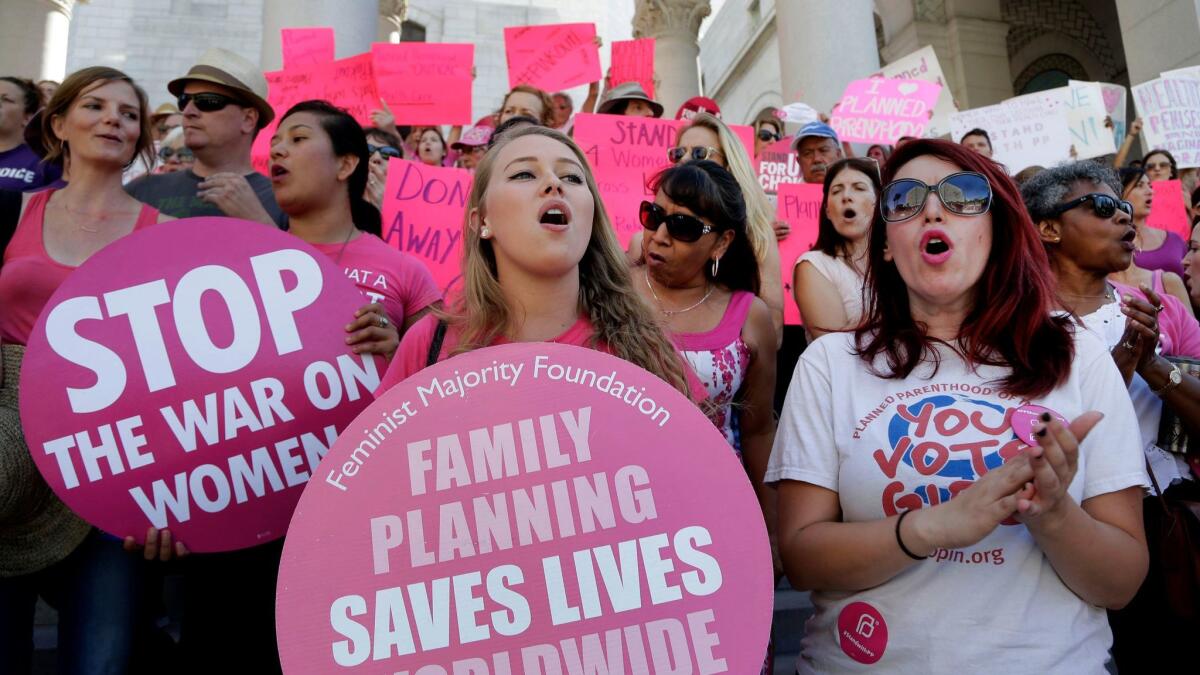Editorial: One Obama rule that Trump should keep: Making sure family planning funds reach everyone who needs them

- Share via
A new rule from the Department of Health and Human Services makes it clear that state agencies should not be determining how to distribute millions of dollars of federal Title X family planning funds based on anything other than a health clinic’s ability to provide those services. This is a provocative but smart move that aims to restore federal funding for healthcare centers serving lower-income populations that have been disqualified by some states simply because they also provide abortions.
This regulation does not suddenly fund abortions. By statute, no federal funds can be used to pay for such services.
Instead, it bars recipients of federal family planning dollars — usually state health departments — from refusing to pass that money along to clinics or healthcare centers for reasons unrelated to their ability to provide Title X services. In doing so, HHS is picking a fight with antiabortion lawmakers across the country just as President Obama is leaving office. Nevertheless, it’s a fight worth having for the sake of women’s health.
According to HHS, more than 4 million women, men and adolescents get these services, which include contraception, pregnancy testing and counseling (which must be neutral and not favor abortion), preconception health services, screening and treatment for sexually transmitted diseases, basic infertility services, and screenings for cervical and breast cancer. Planned Parenthood officials estimate that about a third of the people getting Title X services are getting them at their clinics.
However, a dozen states set irrelevant criteria for eligibility in a transparent effort to defund Planned Parenthood and similar organizations. Most of those states prohibit service providers from receiving Title X funds if they also offer abortions. In the others, facilities run by local governments are prioritized over private ones.
Those restrictive laws have eroded the availability of services, especially to low-income women. As a result, the number of people receiving Title X services has decreased in those areas, according to HHS. Often, the clinics that are best able to reach a large swath of lower-income people end up hamstrung by state regulations. For example, after Kansas passed a law prohibiting private family planning clinics from getting Title X funds, HHS reported, the number of clients — most of whom are low-income — served under Title X dropped more than 37% from 2011 to 2015.
The rule won’t take effect until Jan. 18, and it could be blocked by a GOP Congress primed to reverse regulations adopted in the waning months of the Obama administration. Or states could decide to forgo federal family planning dollars, to the detriment of the health clinics that millions of lower-income people have come to rely on for basic healthcare. Some congressional Republicans are even talking about killing the entire Title X program.
But lawmakers shouldn’t hold women’s health services hostage to their crusade against abortion, which women have a legal right to seek. The HHS rule will help more lower-income women get the reproductive-health and screening services they need. That’s a goal both parties should embrace.
Follow the Opinion section on Twitter @latimesopinion or Facebook
More to Read
A cure for the common opinion
Get thought-provoking perspectives with our weekly newsletter.
You may occasionally receive promotional content from the Los Angeles Times.









